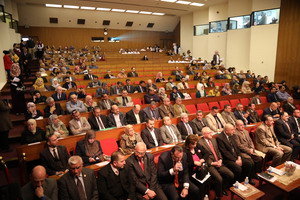 3 March 2019 – According to the International Agency for the Research on Cancer, an estimated 18.1 million cancer cases were diagnosed in 2018. The most common types of cancer are lung, prostate and colorectal cancer, which are among the leading causes of death globally. Mortality due to lung, colorectal and liver cancer is predicted to increase in WHO’s Eastern Mediterranean Region in the next 15 years largely as a result of limited access to diagnosis and treatment. The latest statistics of Iraq’s Ministry of Health’s Department of Planning reveal that cancer is the second leading cause of death after cerebrovascular diseases among the Iraqi population.
3 March 2019 – According to the International Agency for the Research on Cancer, an estimated 18.1 million cancer cases were diagnosed in 2018. The most common types of cancer are lung, prostate and colorectal cancer, which are among the leading causes of death globally. Mortality due to lung, colorectal and liver cancer is predicted to increase in WHO’s Eastern Mediterranean Region in the next 15 years largely as a result of limited access to diagnosis and treatment. The latest statistics of Iraq’s Ministry of Health’s Department of Planning reveal that cancer is the second leading cause of death after cerebrovascular diseases among the Iraqi population.
Under the theme “Strengthening accreditation and quality assurance of cancer diagnosis and treatment in Iraq”, the Ministry of Higher Education and Scientific Research and the Ministry of Health, in coordination with WHO, held a national symposium on 27 February 2019 to mark World Cancer Day. Representatives of the Ministries of Higher Education and Scientific Research and Health and WHO and academia were linked via video conference with WHO experts from the Regional Office for the Eastern Mediterranean, Oxford University, Imperial College London, UK Accreditation Service, Royal College of Pathologists, Iraqi Environment and Health Society UK, United Iraqi Medical Association UK and Ireland and the Iraqi Ambassador to the United Kingdom.
A representative of the Ministry of Higher Education and Scientific Research stressed that a new directive of the ministry was to engage extensively in scientific research with state institutions and the public and private sectors to address cancer. He said: “We support all approaches and urge researchers to introduce their programmes and recommendations into the curricula of medical colleges and be reflected in the vocabulary used by the medical community”. Deputy Minister of Health Dr Hazem Al-Jumaili said: “People’s fear of cancer prevents them from seeking testing and treatment. So, we need a culture of awareness to overcome the disease.” Dr Jumaili stressed that the Ministry of Health’s mandate prioritizes cooperation with all partners and concerned authorities, namely the Ministry of Higher Education and Scientific Research and WHO, to ensure that awareness is raised on preventive measures and cancer is diagnosed and treated early.
Dr Nada Alwan, Director of National Cancer Research Centre, said that, “The aim of the celebration is to raise awareness of cancer, which is considered one of the deadliest diseases and the most challenging problems facing health actors worldwide. The implementation of the strategy for the control of cancer, prevention, early detection, treatment, health care and research promotion in Iraq is of paramount importance”. Dr Alwan added that: “A cancer patient can understand that early detection saves lives: he/she can return to work even if they get cancer. He/she can take control of their cancer journey by making their voice heard and asking for support. We collectively can prevent cancer, build a quality for workforce and create a healthy environment to support others”.
Acting WHO Representative in Iraq Dr Adham Ismail stressed the need for individuals to make a personal commitment to help reduce the impact of cancer, in line with the theme of this year’s campaign: I am and I will. Cancer represents a tremendous burden on patients, families and societies with almost 9.6 million deaths estimated cases in 2018”. Dr Ismail highlighted the work that WHO was doing on noncommunicable diseases. “We are continuing to provide technical support to countries to strengthen national cancer control programmes to reduce the impact of cancer in countries, including Iraq, and to reduce its burden on society. In Iraq, we want to reduce the number of deaths from cancer by strengthening detection and prevention programmes.” He emphasized the important role of cancer registries in reducing the incidence, morbidity and mortality of cancer and improving the quality of life of cancer patients through the systematic implementation of evidence-based interventions in prevention, early diagnosis, treatment, and palliative care.
For more information, please contact:
Gheeda Mayahi
WHO Communications Officer
(+964) 7827886765
This e-mail address is being protected from spambots. You need JavaScript enabled to view it
Pauline Ajello
WHO Communications Officer
(+964) 7510101460
This e-mail address is being protected from spambots. You need JavaScript enabled to view it
Ajyal Sultany
WHO Communications Officer
(+964) 7740 892 878
This e-mail address is being protected from spambots. You need JavaScript enabled to view it




